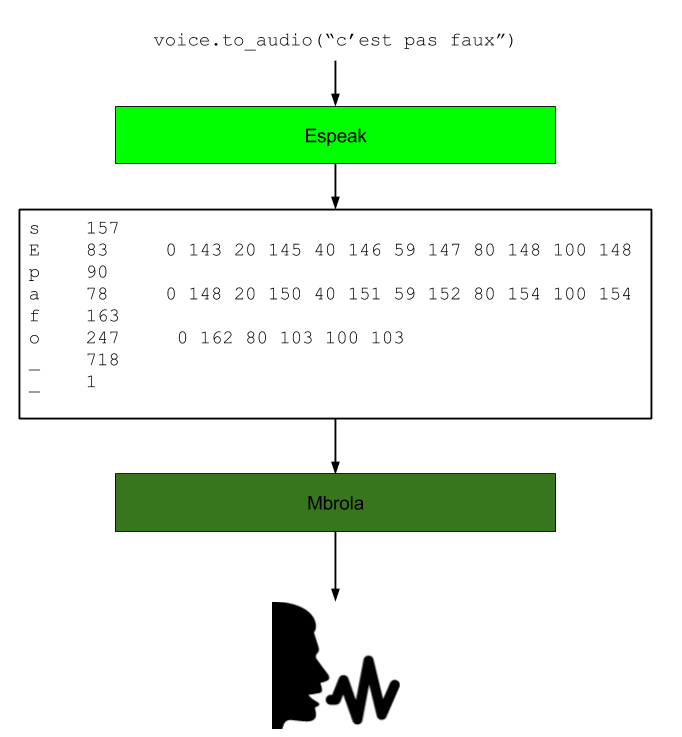An introduction to Voxpopuli¶
Tutorial¶
Picking a voice and making it say things¶
The most simple usage of this lib is just bare TTS, using a voice and a text. The rendered audio is returned in a .wav bytes object:
from voxpopuli import Voice
voice = Voice(lang="fr")
wav = voice.to_audio("salut c'est cool")
Evaluating type(wav) whould return bytes. You can then save the wav using the wb file option
with open("salut.wav", "wb") as wavfile:
wavfile.write(wav)
If you wish to hear how it sounds right away, you’ll have to make sure you installed pyaudio via pip, and then do:
voice.say("Salut c'est cool")
Ou can also, say, use scipy to get the pcm audio as a ndarray:
import scipy.io.wavfile import read, write
from io import BytesIO
rate, wave_array = read(BytesIO(wav))
reversed = wave_array[::-1] # reversing the sound file
write("tulas.wav", rate, reversed)
Getting different voices¶
You can set some parameters you can set on the voice, such as language or pitch
from voxpopuli import Voice
# really slow fice with high pitch
voice = Voice(lang="us", pitch=99, speed=40, voice_id=2)
voice.say("I'm high on helium")
The exhaustive list of parameters is:
lang, a language code among those available (us, fr, en, es, …). You can list them usingVoice.list_voice_ids().voice_id, an integer, used to select the voice id for a language. If not specified, the first voice id found for a given language is used.pitch, an integer between 0 and 99 (included)speed, an integer, in the words per minute. Default and regular speed is 160 words-per-minute.volume, float ratio applied to the output sample. Some languages have presets that our best specialists tested. Otherwise, defaults to 1.
Handling the phonemic form¶
To render a string of text to audio, the Voice object actually chains espeak’s output to mbrola, who then renders it to audio. Espeak only renders the text to a list of phonemes (such as the one in the IPA), who then are to be processed by mbrola. For those who like pictures, here is a diagram of what happens when you run voice.to_audio(“Hello world”)
How this works is explained in more details in the section Understanding Espeak and Mbrola
Funny thing is, with voxpopuli, you can “intercept” that phoneme list as a simple object, modify it, and then pass it back to the voice to render it to audio. For instance, let’s make a simple alteration that’ll double the duration for each vowels in an english text.
from voxpopuli import Voice, BritishEnglishPhonemes
voice = Voice(lang="en")
# here's how you get the phonemes list
phoneme_list = voice.to_phonemes("Now go away or I will taunt you a second time.")
for phoneme in phoneme_list: # a PhonemeList instance works mostly like a regular list object
if phoneme.name in BritishEnglishPhonemes.VOWELS:
phoneme.duration *= 3
# rendering and saving the sound, then saying it out loud:
voice.to_audio(phoneme_list, "modified.wav")
voice.say(phoneme_list)
Note
- For French, Spanish, German and Italian, the phoneme codes
used by espeak and mbrola are available as class attributes similar to the
BritishEnglishPhonemesclass as above. - More info on the phonemes can be found here: SAMPA page
FAQ/Miscellaneous Examples¶
Here is a miscellaneous list of things that you might want to do with Voxpopuli. If something seems to be obviously missing from this list, don’t hesitate and post an issue on the the package’s github page.
Listing all avalaible voices¶
You can list all available voices for all languages on your current installation of voxpopuli this way:
>>> from voxpopuli import Voice
>>> print(Voice.list_voice_ids())
{'de': ['1', '3', '5', '8', '4', '7', '2', '6'],
'en': ['1'],
'fr': ['7', '2', '1', '3', '4', '6', '5'],
'it': ['3', '1', '2', '4']}
You can also directly get all the available voices instances for a particular language:
>>> it_voices = Voices.get_voices_for_lang("it")
>>> it_voices[0].say("buongiorno ragazzi!")
Using Voxpopuli as a phonemizer¶
Although there are packages that are specialized in that regard
(such as phonemizer), voxpopuli
can be used as a simple phonemizer.
>>> phoneme_list = Voice(lang="es").to_phonemes("Hola mi amigos, donde esta la biblioteca?")
>>> [pho.name for pho in phoneme_list]
['o', 'l', 'a', 'm', 'i', 'a', 'm', 'i', 'g', 'o', 's', '_', '_', 'd',
'o', 'n', 'd', 'e', 'e', 's', 't', 'a', 'l', 'a', 'b', 'i', 'b', 'l',
'i', 'o', 't', 'e', 'k', 'a', '_', '_', '_', '_']
